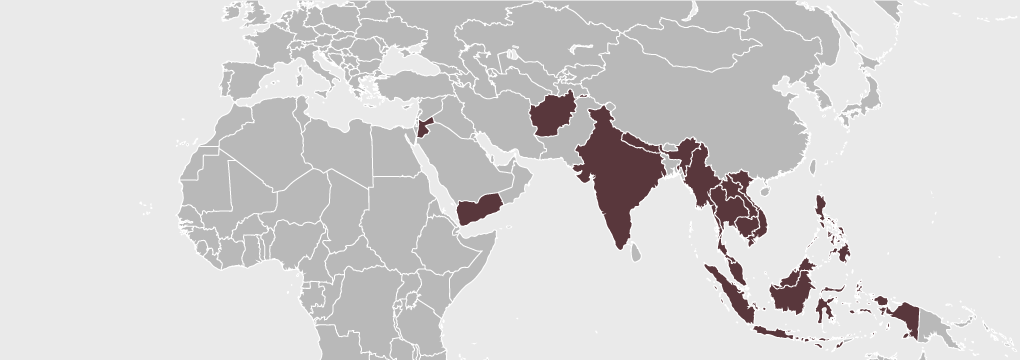The Health Policy Project ended in 2016. Work continued under Health Policy Plus (HP+) until 2022.
AME GPM Program

Country & Regional Programs
- ► Africa
- ► Asia and the Middle East
- ► Europe and Eurasia (E&E)
- ► Latin America and the Caribbean (LAC)
Gender, Policy, and Measurement for Effective Scale-Up of Health Innovations
AME Home | AME GPM | Gender | Policy | Measurement
.jpg)
Scale-up is defined as a process that seeks to “deliberately increase the impact of successfully tested health innovations so as to benefit more people and to foster policy and program development on a lasting basis” (ExpandNet). Scaling up initiatives that strengthen health systems and expand the reach of essential services and commodities is crucial for implementing sustainable programs that improve the health of individuals, families, and communities throughout the developing world.
The Gender, Policy, and Measurement (GPM) program, funded by the USAID Asia and Middle East (A/ME) Bureaus, is collaborating with USAID health programs and other partners in the A/ME regions to strengthen programs for scale-up in family planning and maternal, neonatal, and child health. The GPM program works to address gender inequality and implement supportive policies and systems that augment the sustainability and foster scale-up of effective programs. GPM also measures the impact that gender integration and policy implementation have on health programs, a critical step in determining the efficacy of its actions.
In doing so, USAID health programs can maximize the resources and efforts required to improve the health and well-being of men, women, and children across Asia and the Middle East. The GPM program will also contribute to global efforts in scale-up by synthesizing, disseminating, and facilitating shared learning on global evidence of scale-up models, lessons learned on the most effective approaches, and efforts to monitor scale-up, with a particular focus on addressing gender and policy.
The GPM program is implemented by the Health Policy Project (HPP) and MEASURE Evaluation, and focuses on three areas:
- Gender: Identifying and addressing gender gaps and opportunities in scaling up health programs to enhance health outcomes and increase gender equality.
Read more about GPM gender component
- Policy: Ensuring that policy issues related to health programs are addressed and that strong policies and health systems are developed and implemented to foster effective scale-up of health innovations.
Read more about GPM policy component
- Measurement: Evaluating the impact of health programs to test the hypothesis that integrating gender and implementing policy will lead to better health outcomes.
Read more about GPM measurement component
GPM activities complement existing USAID health programs and are also implemented in collaboration with in-country government and other donor and multilateral efforts. The knowledge from in-country applications and evaluations, and other GPM knowledge generation will be shared broadly through many forums including a community of practice, workshops, white papers, and online resource libraries. As a result, countries in the A/ME regions should be better able to take gender, policy, and health systems strengthening into account in efforts to improve and expand health programs.
News
Transforming Gender Norms, Roles and Power Dynamics for Better Health in India
Publications and Resources
Transforming Gender Norms, Roles, and Dynamics for Better Health: Supplemental Resource Briefs
The GPM program, funded by the Asia bureau of USAID and implemented by the Health Policy Project (HPP) and MEASURE Evaluation, undertook a comprehensive, systematic review of the impact of gender-integrated programs on health outcomes. The findings are primarily intended to inform the work of government officials, donors, nongovernmental organizations, and other key stakeholders involved in health programming in India, as well as other low- and middle-income countries around the world.
Webinar: Understanding What Works in Gender-Responsive Health Governance
During this Webinar, Jennifer Pendleton and Laili Irani of the Health Policy Project will present initial findings from a global literature review, key informant interviews, and an expert consultation examining the institutional mandates and roles of gender and health ministries in strengthening gender integration within health sector policy, institutions, and systems.
Approach for Addressing and Measuring Policy Development and Implementation in the Scale-Up of Family Planning and Maternal, Neonatal, and Child Health Programs
Approach for Promoting and Measuring Gender Equality in the Scale-Up of Family Planning and Maternal, Neonatal, and Child Health Programs
Family Planning and Maternal, Neonatal, and Child Health in Timor-Leste: Assessing Gender Constraints and Opportunities, Improving Outcomes
Gender assessment exploring the normative, socio-economic, and power dynamics and political variables that impede and/or facilitate access to and use of health services in Timor-Leste.
Integrating Gender into the Scale-up of Family Planning and Maternal, Neonatal, and Child Health Programs
Working paper analyzing whether gender factors in planning and scaling up programs improve the effectiveness of that process.
The Policy Dimensions of Scaling Up Health Initiatives
Working paper examining policy issues associated with scaling up family planning and maternal, neonatal, and child health programs.
Policy Dimensions of Scaling up Family Planning and Maternal, Neonatal, and Child Health Services
Recorded webinar presented by Dr. Karen Hardee.
Promoting Gender Equality and Social Inclusion in Local Health Governance in Nepal
Brief about HPP efforts to strengthen the capacity of local Health Facility Operation and Management Committees to promote gender equality in provision of health services in Nepal.
Expert Meeting on Policy Implementation and Gender Integration in the Scale-Up of Family Planning and Maternal, Neonatal, and Child Health Best Practices
Report from expert meeting on experiences with scaling up best practices in family planning and maternal, neonatal, and child health
ExpandNet Scaling-Up Bibliography
This bibliography includes publications, websites, grey literature, and conference reports that address scaling up.
Asia and Middle East Gender, Policy, and Measurement Project Contact Information
If your organization or project is interested in working with the Gender, Policy, and Measurement project, please contact:
Elisabeth Rottach, MA
HPP Gender Technical Advisor
ERottach@futuresgroup.com

